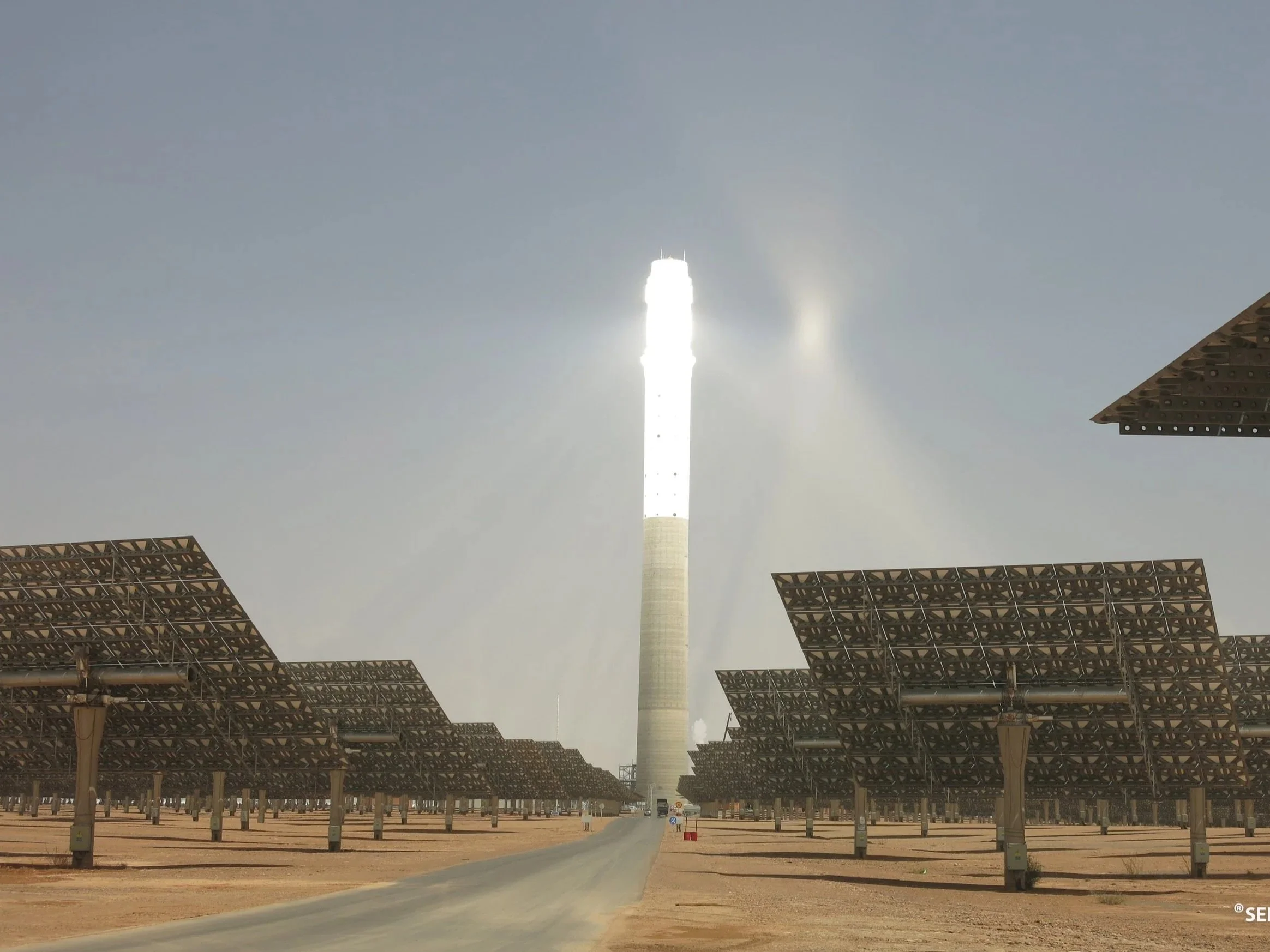
Energy Security in the Mediterranean:
The Case for Tripling Renewables
By Karim Elgendy
26 August 2025
The stability of the Mediterranean increasingly hinges on energy security. Facing volatile fossil fuel markets and surging power demand, most Mediterranean countries have signed the Global Renewables and Energy Efficiency Pledge to triple renewable energy capacity by 2030. Accelerating the clean energy transition is a climate policy imperative and an exercise in strategic statecraft. By expanding solar, wind, and other clean sources, Mediterranean nations can bolster three core dimensions of energy security: availability and supply adequacy, affordability and accessibility, and diversification of sources and infrastructure.
Meeting Tomorrow's Demand Today
The most immediate test of this transition lies in meeting basic supply needs. Electricity demand is rising quickly. In Southern Mediterranean countries, final energy use could double by 2040, with power demand potentially tripling as heatwaves drive air-conditioning loads. Systems built around imported fuels are vulnerable when shocks arrive. In Lebanon, for example, fuel shortages forced its national power company, Électricité du Liban (EDL), to exhaust its fuel reserves, causing a nationwide blackout in August 2024 that brought essential services to a standstill. In 2023-24, Egypt imposed daily rolling blackouts during extreme heat and gas shortages, affecting energy access for both households and industry.
Accelerating renewables addresses supply adequacy by adding domestic generation at speed. Last year, the Egyptian government signed a land access agreement with Masdar, Infinity Power, and Hassan Allam Utilities to develop a landmark 10 GW onshore wind farm in Upper Egypt, a project expected to save approximately $5 billion per year in natural gas imports. Lebanon’s citizens deployed distributed solar at record pace, with rooftop and off‑grid systems surging to approximately 870 MW by end of 2022, a 47‑fold rise in annual additions since 2020, helping keep the lights on amid grid failures and diesel shortages.
Reliability improves when generation is distributed and networks are connected. Modern grids can balance solar and wind across geographies and time zones. The European Commission is developing the Trans-Mediterranean Energy and Clean Tech Cooperation Initiative (T-MED)—a strategic framework to accelerate renewable energy production, cross-border electricity trade, and clean-tech industrial development across the Mediterranean region. Grid resilience is also advancing through targeted regional investments in storage and smart-grid technology. In Greece, a 4.7 GW battery storage program launched in 2025 is designed to reduce renewable curtailment and give grid operators rapid-response capability during demand surges. Cyprus is deploying 400 MWh of transmission-owned battery systems at key substations to store excess solar and wind and release it when needed, thus stabilizing supply. Yet even when supply is adequate, energy security remains fragile if that power comes at unsustainable costs.
The Economics of Independence
This is where renewables offer their second strategic advantage. The 2022 gas price crisis exposed the risks of fossil dependence. That summer, record solar generation helped the EU avoid €29 billion in gas imports, easing pressure on consumers and public budgets. As deployment has grown, technology costs have plunged: In 2024, the International Renewable Energy Agency reported that solar PV projects were 41% cheaper and onshore wind 53% cheaper than the cheapest fossil-fuel alternatives. In many Mediterranean markets today, new solar and wind farms generate electricity cheaper than gas‑fired power plants.
Lower costs translate into better access. Tunisia demonstrates this clearly. The country generates 97% of its power from fossil fuels and imports nearly half its gas. Heavy import bills have pushed the energy trade deficit above 7% of GDP. Yet Tunisia’s renewable potential is approximately 320 GW, compared to a peak demand of only about 5 GW. This presents it with a vast opportunity to replace costly imports with homegrown power. Scaling utility‑scale projects alongside rooftop solar and storage can cut production costs, stabilize prices for households and businesses, and reduce subsidy pressures.
Southern Europe’s momentum is also helping shield consumers. In Greece, renewables supplied 57% of electricity in 2023 as solar became a major contributor, dampening exposure to gas price swings. Morocco continues to expand its renewable energy capacity, reaching 40% of total installed capacity last year according to the national regulator, reinforcing a strategy to reduce import dependence. For consumers across the region, more renewables means predictable, stable‑cost electricity, fewer fuel shocks, and faster connections for underserved communities through distributed systems that can leapfrog legacy system constraints. But affordable, accessible power means little if it depends on a single source or supplier.
The co‑benefits for tripling renewables are also substantial: faster grid upgrades, cleaner air, industrial opportunities in clean‑tech manufacturing, and new avenues for regional cooperation.
Noor station and solar panels in Oarzazate, Morocco. Credit: Sener.
Building Resilience Through Diversity
This brings us to the third pillar of energy security: resilience through diversity. Many Mediterranean systems rely heavily on one fuel and, in some cases, one supplier. Tunisia depends on Algerian gas for a large share of its electricity generation, highlighting the risks of concentrated supply. Tripling renewables spreads risk across different technologies and across different geographies. With weather systems being regional and variable, what clouds one coast may spare another. With adequate interconnections, surplus wind in the Aegean can offset a lull elsewhere; North African solar peaks can cover afternoon demand further north.
Diversification also concerns supply chains. Europe’s rapid build‑out has relied heavily on imported solar modules, batteries, and other components. To avoid swapping one dependency for another, the EU has adopted the Net‑Zero Industry Act, aiming for 40% of the bloc’s annual clean‑tech deployment needs to be manufactured in Europe by 2030. Complementary partnerships can reinforce resilience. The EU–Egypt renewable hydrogen partnership lays a pathway for industrial cooperation, transmission upgrades, and future hydrogen and derivatives exports, a diversification of both energy and industrial ties.
Market rules matter. A regional framework and regional market coupling help align planning, permitting, and system operations across borders. Clearer rules reduce investor risk and speed up projects. Together, these steps create a more diverse and resilient system: multiple generation types, multiple suppliers, multiple routes – and a larger, more liquid market able to absorb shocks without cascading failures. These three dimensions—adequate supply, affordable access, and diversified sources—reinforce each other in a virtuous cycle.
Beyond Climate: An Energy Security Necessity
Taken together, the evidence points to an inescapable conclusion: tripling renewables is not merely an environmental goal but a strategic necessity for the Mediterranean. It will add ample domestic supply to meet growing demand, stabilize prices, increase electricity access for citizens and businesses, and diversify both energy mixes and supply chains to withstand disruptions. The co‑benefits for tripling renewables are also substantial: faster grid upgrades, cleaner air, industrial opportunities in clean‑technology manufacturing, and new avenues for regional cooperation. Recent experience, from Europe’s avoided gas costs in 2022 to Lebanon’s solar surge, shows how quickly outcomes improve when renewables scale.
The alternative is precarious and costly: continued exposure to fuel price spikes, constrained supply during heatwaves, and geopolitical leverage over essential energy flows. By accelerating deployment, strengthening interconnections, and localizing parts of the clean-technology supply chain, Mediterranean countries can secure a cleaner, more stable, and resilient future.
Karim Elgendy is the Executive Director of the Carboun Institute.




